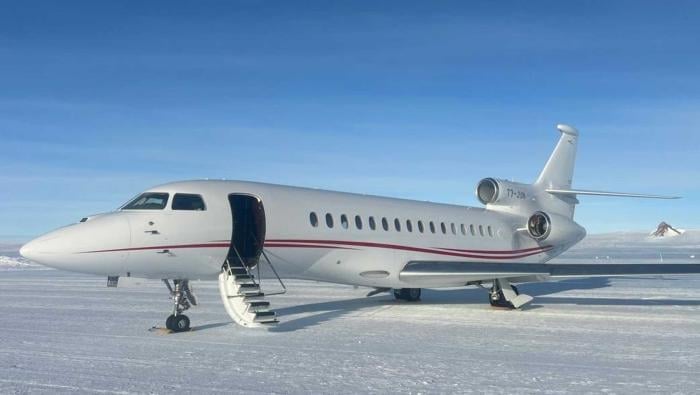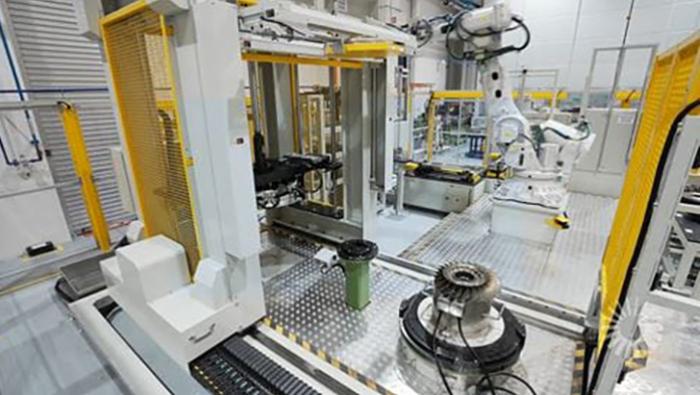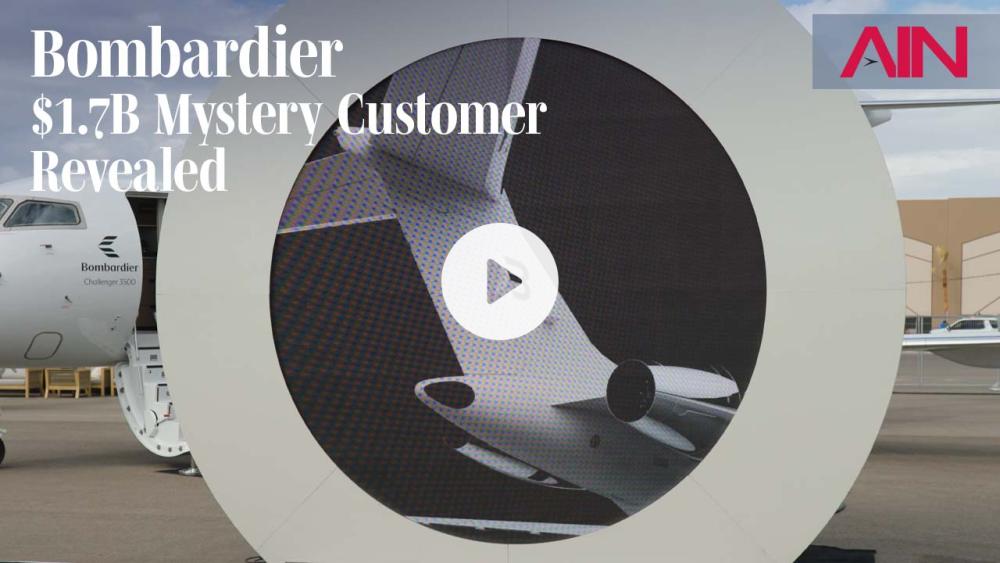|
ACASS completed its first-ever flight to Antarctica on October 28 with a Dassault Falcon 8X, a rare mission marking the culmination of several months of multi-jurisdiction coordination. The global business aviation services provider said the flight is the first of seven scheduled trips for the ACASS-operated trijet—and just one of 10 business aviation flights overall—this season, reflective of the complexity of the undertaking. ACASS v-p of operations Derek Holtter attributed the rarity of flights to Antarctica to “the extreme environmental conditions, logistical challenges, and regulatory coordination required.” He elaborated that it took several months of collaboration between aviation authorities and stakeholders to make the project happen, with “multi-jurisdiction coordination and the unique flight environment of Antarctica [making] this operation a significant milestone for ACASS.” Onboard the Falcon 8X were a San Marino CAA inspector and eight team members from White Desert Antarctica. Founded in 2005, this polar exploration company is the first operator to fly guests directly from South Africa’s Cape Town to its privately-operated 3,000-meter-long Wolf Fang runway in Antarctica. Despite ACASS’ experience in operating “in the most challenging regions of the world,” Holter said Antarctica had so far remained the “one continent [it] hadn’t conquered”—a milestone that has now been successfully achieved. |
|
|
Embraer today reported record third-quarter revenues of more than $2 billion, driven by 62 aircraft deliveries, with the majority being executive jets. Speaking to analysts, the Brazilian airframer’s president and CEO, Francisco Gomes Neto, acknowledged that earnings were dented in the three months ending September 30 due to U.S. tariff costs of $17 million, reducing margins by around 2.5%. Of the 41 business jets Embraer delivered in the quarter, 23 were midsize/super-midsize Praetor models and the other 18 were Phenom light jets, with this overall rate remaining stable compared with the same year-ago period. The company boosted its airliner deliveries from 16 in third-quarter 2024 to 20 in the most recent period, including 13 E195 E2s and seven E1 models. Net revenues grew by 18% in the quarter, with Neto praising progress made by his production teams to increase aircraft deliveries by 16%. He said that lead times for Praetors has been cut by 40% versus 2021 levels, while the equivalent improvement for E-Jets was 27%. Embraer has been able to raise prices for both aircraft portfolios. Order backlogs, including defense and service/support bookings, at the end of the quarter showed 38% growth, to $31.3 billion—rising to around $50 billion, if options are factored in. Its executive jet division made the most progress in this regard, recording a 65% boost, to $7.3 billion. |
|
|
Pilatus Aircraft has delivered the first PC-12 Pro to a U.S. customer some eight months after the Swiss airframer announced the latest update to its venerable PC-12. The Pro incorporates a new Pilatus Advanced Cockpit Environment (ACE) flight deck based on the Garmin G3000 Prime and folds in features such as Autoland. Pilatus delivered the first copies of the Pro to customers in Australia and Europe last month. U.S. owners Ravi and Pheroza Arcot accepted their Pro edition, S/N 3005, at Pilatus’ North American headquarters in Broomfield, Colorado, and plans to base the turboprop single in the Northeast. Notably, the delivery also comes after Pilatus had placed a moratorium on U.S. shipments in August due to the 39% tariffs imposed on Swiss products. Replacing the Honeywell Apex suite in previous PC-12 NG and NGX models, ACE includes five high-resolution touchscreen displays, a fully integrated Autoland system, and Garmin’s GFC 700 autopilot with autothrottle. Further, the $6.8 million turboprop single includes a 100-pound maximum payload increase, along with more cabin options and special paint schemes. Pilatus did not respond to AIN’s inquiry about whether this ends the pause on U.S. deliveries and who paid the tariffs for this PC-12 Pro. |
|
|
As it approaches certification, Bombardier said its Global 8000 will have a 2,691-foot cabin altitude at FL410, a threshold the Canadian manufacturer claims as the lowest in the industry. This announcement of the reduced cabin altitude—which compares with the 2,900 feet of the ultra-long-range twinjet’s Global 7500 predecessor—comes just weeks after Bombardier confirmed a Mach 0.95 top speed for the Global 8000, another high watermark in the business aviation sector. Bombardier stressed the cabin altitude's importance for passenger well-being. “The ultimate comfort in the sky is feeling like you’re at home. We have focused heavily on elevating the passenger experience, imperative priorities for ultra-long-range travel,” said Stephen McCullough, senior v-p of engineering and product development at Bombardier. Along with the lower cabin altitude, Bombardier incorporates a Pũr Air system with HEPA air filtration for fresh air onboard the long flights. Bombardier said the Global 8000 remains on track to enter service by year-end. |
|
|
Sponsor Content: RTX How automation is helping cut a GTF assembly process time in half. |
|
|
Software-focused investment firm Thoma Bravo yesterday completed its purchased of portions of Boeing’s Digital Aviation Solutions business for $10.55 billion in cash. The sale included Jeppesen, ForeFlight, AerData, and OzRunways. Thoma Bravo has named the entity Jeppesen ForeFlight, which is now led by former Boeing v-p of Digital Aviation Solutions CEO Brad Surak. ForeFlight was founded in 2007 and took advantage of then-new devices to deliver aeronautical chart display capabilities on Apple iPod Touchs and iPhones. When the iPad was introduced in 2010, ForeFlight quickly became the electronic flight bag software of choice, and it has grown into widespread use in business and general aviation, airline, and military cockpits. Boeing bought ForeFlight in March 2019 and Jeppesen Sanderson in 2000, but the two companies were run essentially separately and their key products were never merged. Jeppesen data is, however, an important part of many ForeFlight products. Just prior to the closing of the sale, Jeppesen announced that by Oct. 31, 2026, it will no longer offer paper charts, signifying the end of an era. According to Surak, “Backed by 90 years of Jeppesen’s gold-standard data and ForeFlight’s relentless spirit of exploration, this combination is building the most unified, intuitive platform in aviation. As we return to independence alongside a leader in software private equity investing, we’re enabled to move faster, think bigger, and innovate.” |
|
|
Looking to change the way aviation fuel is bought and sold, JetFuel Direct (JFD) has entered the market with the debut of its digital product. Launched last year, JFD says its platform simplifies complex fueling procedures for business aviation, regional carriers, and cargo haulers with transparency and efficiency that benefits companies on both sides of the transaction. Helmed by co-founder and president Dave Diulus, a veteran of the aviation fueling industry, JFD promises suppliers faster cash flow with settlement in approximately 48 hours; control over pricing with flexibility by location, date, and volume uplift; and forecasting and budgeting support with no required capital investment or heavy IT integration. For operators, benefits would include simplified fueling procedures and predictable uplift costs. The system provides transparent pricing, referenced against Platts market values rather than retail numbers, and gives detailed breakdowns of into-plane charges, taxes, and fees at the airport level. “Operators want a straightforward, predictable process, and suppliers want to know they’re pricing fairly and getting paid quickly,” Diulus told AIN. “We’ve built a platform that does both.” The company will concentrate its initial efforts in Europe, where interest in streamlining fueling logistics has been strong, before branching out to other markets. Later this month, it will demonstrate the system and meet with suppliers at the IATA Aviation Energy Forum in Mexico City. |
|
|
Beta Technologies is seeking to raise more than $1 billion through an initial public offering on the New York Stock Exchange. The electric aircraft developer offered 29,852,941 Class A shares priced at $34 when the market opened today, while also granting underwriters a 30-day option to purchase an additional 4,477,941 shares. Its initial offering is expected to close tomorrow, with the company trading under the ticker symbol BETA. The IPO is being made solely through a prospectus offered via lead book-running managers Morgan Stanley and Goldman Sachs. U.S.-based Beta is working towards type certification for its Alia CX300 airplane and Alia 250 eVTOL, which respectively operate in conventional and vertical takeoff and landing modes. It recently delivered early examples of the CX300 for operational trials to be conducted by early-use case customers Bristow and Air New Zealand. This CX300’s target timeline for FAA certification is reported as late 2026/early 2027, with the Alia 250 expected to follow 12 months later. Beta is also working on certification for its H500A electric motors. Beta founder and CEO Kyle Clark has confirmed plans to develop larger aircraft than the current six-seat models, potentially with capacity for carrying between 19 and 150 passengers. The company’s business model encompasses a evolving family of aircraft for applications spanning medical logistics, cargo deliveries, military roles, and passenger transportation services. |
|
|
Honeywell has named Jim Currier as president and CEO of Honeywell Aerospace and Craig Arnold as non-executive board chair for its aerospace division, the company announced yesterday. The appointments prepare the business for its planned spinoff as an independent, publicly-traded company in the second half of 2026. Currier has led Honeywell Aerospace Technologies since 2023 and previously held senior roles across the company, including president of the electronic solutions unit and v-p of airlines for North America. Arnold, former chair and CEO of Eaton, joins Honeywell’s board immediately and will assume his new role as chair upon completion of the spinoff. “As a standalone company, Honeywell Aerospace will be one of the largest publicly listed pure-play aerospace suppliers, with more than $15 billion in 2024 sales,” Honeywell chair and CEO Vimal Kapur said. “Together, Jim and Craig bring extensive leadership experience and complementary industry expertise across aerospace and industrial operations that make them the ideal fit to lead Honeywell Aerospace in this new chapter.” In February, Honeywell revealed plans for a full separation of its aerospace and automation businesses. The aerospace company will be headquartered in Phoenix and focus on propulsion, cockpit, and navigation systems, as well as auxiliary power systems across commercial and defense platforms. |
|
|
Bond To Shake, Not Stir, Frax Market with $1.7B Bombardier Order U.S. start-up company Bond revealed plans to launch a fractional ownership operation with a fleet of Bombardier Challenger 3500s and Global 6500s under a previously announced $1.7 billion, 50-aircraft order.
|
|
|
|
|
|
|
AINalerts News Tips/Feedback: News tips may be sent anonymously, but feedback must include name and contact info (we will withhold name on request). We reserve the right to edit correspondence for length, clarity, and grammar. Send feedback or news tips to AINalerts editor Chad Trautvetter. |
|
AINalerts is a publication of AIN Media Group, 214 Franklin Avenue, Midland Park, New Jersey. Copyright 2025. All rights reserved. Reproduction in whole or in part without permission is strictly prohibited. |







%20(1).gif)









